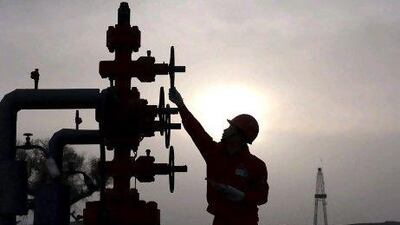If evidence were needed that the spoils of war are not always handed to the winner, Afghanistan has provided it this week.
Are you the strongest link?
Business Quiz 2011 Do you have your finger on the pulse of business? Take our online contest for your chance to win brunch for two. Take the quiz
The US may have spent nearly US$120 billion (Dh440.79bn) last year alone on operations in the country, and lost more than 1,700 military personnel since the conflict there began in 2001. But that is of little help when it comes to securing oil contracts.
Yesterday, China National Petroleum Corporation (CNPC) signed an agreement to develop three blocks of the war-ravaged nation's Amu Darya basin in the first of what will be many such oil-related agreements international players look to secure.
CNPC is cutting a swathe across the globe as the world's most populous nation seeks energy to power an economy growing at near double-digit rates. In an auction it fended off competition from companies based in Pakistan, Australia, the UK - as well as Schlumberger, headquartered in the US, France and the Netherlands - to secure the right to set up a joint venture with Afghan Oil and Gas.
The deal for CNPC to build a refinery and lead exploration in three fields, which are reported to have 80 million barrels between them, involves fairly onerous terms for the state-owned energy giant, based in Beijing. These include handing over more than two thirds of profits to the administration in Kabul.
Yet by getting a foot in the door, China, whose companies are typically less risk-averse than their western counterparts, is smoothing a path to securing similar agreements.
The US's reason for invading Afghanistan a decade ago was to unseat the Taliban and prevent the country from continuing to act as a training ground for terrorists. Yet even in this context, it will be a disappointment, with all the resources Washington has put into trying to get the country back on its feet, if US interests are shut out of the nation's energy sector.
Northern Afghanistan is believed by the US Geological Survey to have reserves of about 1.8 billion barrels, making the country important as Beijing diversifies its supplier base, especially in the face of apparent intransigence from Iran, one of its established suppliers.
It is not just hydrocarbons that China is looking for in Afghanistan. As the country rebuilds after a decade of turmoil, there will be vast infrastructure contracts up for grabs. And Chinese companies have shown through their activities in Africa that they are among the best placed to carry out large-scale building projects at competitive prices.
If this week's oilfield announcement in Afghanistan gives some observers a sense of deja vu, there is good reason.
Turn the clock back a couple of years and it was a similar story in Iraq, with the US cold-shouldered when key energy contracts were awarded. There, too, China has walked off with a good share of the spoils, with US interests often not bidding for major contracts.
With the Rumaila oilfield in Iraq, for example, ExxonMobil decided against entering the bidding as a result of the modest fees per barrel the Iraqi government was offering to pay the winning contractor. Instead, a tie-up between CNPC and BP landed the deal.
There have been other instances in which US oil giants have declined for financial reasons to enter public auctions for oil contracts in Iraq, and observers have also noted their failure to secure deals outside the auction process.
ExxonMobil has by no means been completely shut out of Iraq and the chance to harvest the country's 115 billion barrels of reserves - the West Qum oilfield is one area where the US giant has been successful. But, nonetheless, the dominance many expected US interests to achieve in Iraq has not materialised.
In Central Asia, it is a similar tale, only there it is Russia that is being outmanoeuvred by China, which overtook the US last year to become the world's biggest energy consumer.
China's healthy financial position and reputation for promptly completing infrastructure projects has won the country a wave of contracts, many involving loans from Chinese banks to secure access to future energy supplies.
Turkmenistan and Kazakhstan, in particular, are becoming increasingly important as oil and gas suppliers. There has been a vast investment in pipelines that head directly to western China, allowing the Central Asian nations to break the control Russia traditionally held over their energy sectors.
In Mongolia, China's economic stranglehold, especially over natural resources, is such that is has fuelled a nationalist backlash.
An expert this week predicted in The National that Chinese interests would be making an announcement soon on a major UAE-related project, providing yet more evidence of the dragon economy's growing leverage in the world's energy sector. With China home to 1.3 billion people whose energy needs are continuing to grow, no one should be surprised.
twitter: Follow our breaking business news and retweet to your followers. Follow us


